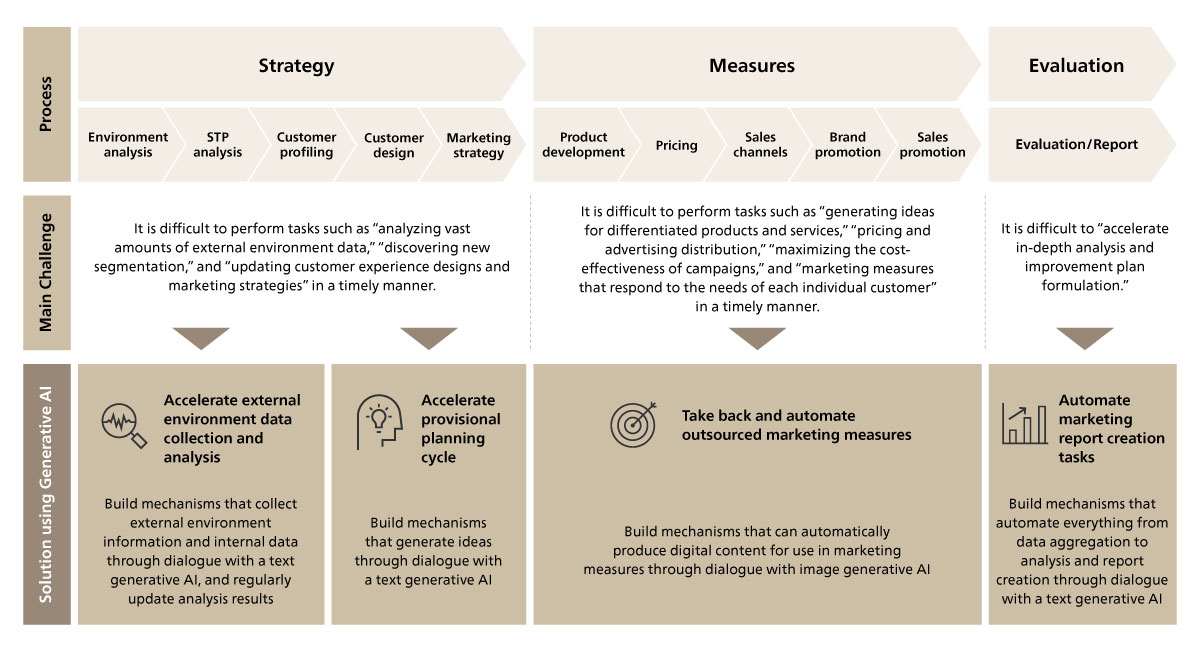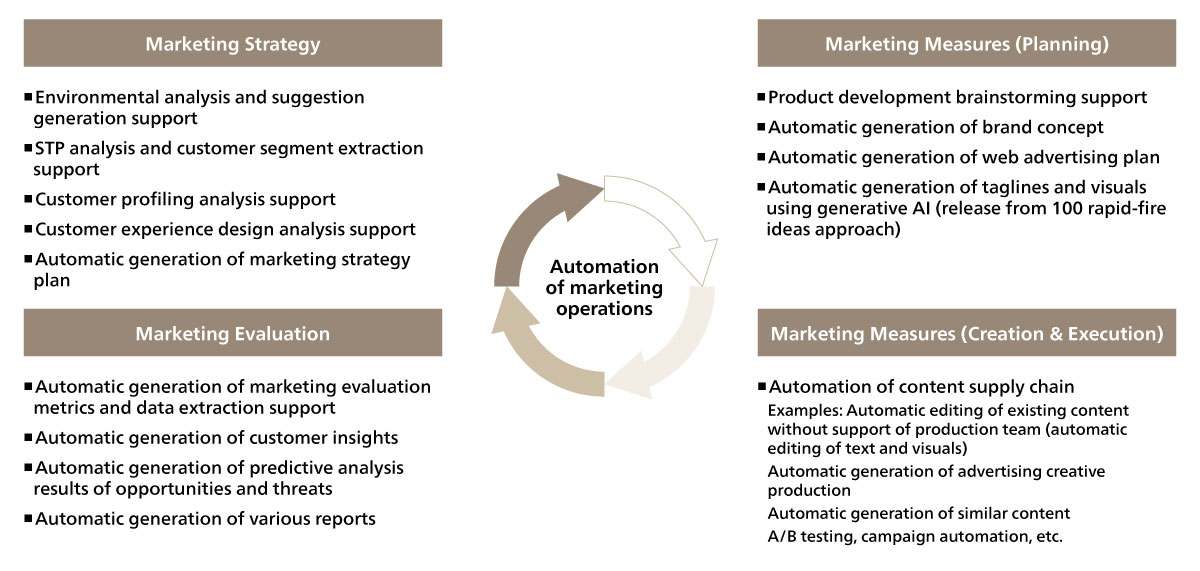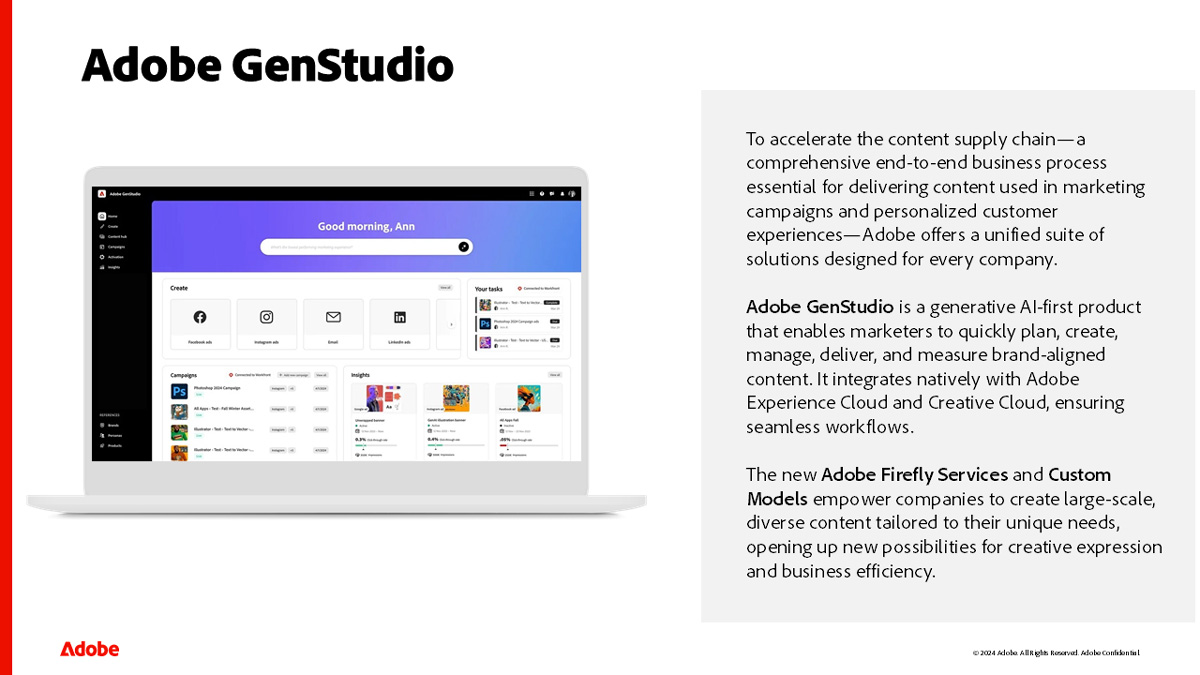Generative AI is expected to bring significant changes to the business environment. How will generative AI transform the field of marketing? In this discussion, two experts - Tatsuya Kaji, Director at ABeam Consulting Ltd., and Toshio Matsuyama, at Adobe K.K. - exchanged views on the theme of automating marketing operations using generative AI.
What is the automation of marketing operations through generative AI?
- Marketing, Sales, and Customer Service
Challenges of marketing operations
Interviewer: What led to a consideration of Business Process Automation in comprehensive marketing area?
Kaji: The trigger for this initiative was our investigation into the transformation of the marketing operations for an airline client. Marketing operations are generally divided into three categories of Strategy, Measures, and Evaluation. A marketing team formulate the strategies, plan and implement the measures, and evaluate the results. It sounds simple, but in reality, the tasks are incredibly high in number and require specialists for execution. This company did not have enough specialists. Every existing member of the client’s team struggled to improve quality and efficiency while working to keep the day-to-day operations running.
For airlines, data on customers and external environment surrounding the airline market collected and analyzed to formulate strategies. For example, let's suppose that, based on the result of an external environment analysis, in line with the recovery of inbound demand, the marketing team decides to shift its strategy from a COVID-19 era approach to targeting foreign tourists for sales growth.
Next, measures need to be changed to suit the new strategy. The team prepares measures for everything from the development of services and products offered throughout the process of booking a flight ticket to boarding the plane and leaving the airport, as well as promotion measures for digital sales. Then, since effective communication cannot be achieved by treating foreign tourists as a single segment, the team must subdivide the segment and prepare targeted measures.
With the implementation of each measure, the team needs to quickly evaluate, analyze, and report the results to management. Cause analysis and formulation of improvement plans are just as important as the results themselves.
Anyone involved in marketing can easily imagine how challenging it is to execute this entire cycle with a small team.
Interviewer: With the increasing use of technology such as AI and the need to gain deep insights through data analysis, the workload of marketers has even further increased.
Kaji: Marketing teams are expected to not only quickly analyze which channels, segments, and types of users responded in what way, and which measures contributed most to sales when looking at the entire customer journey but obtain deep insights that help maximize the effectiveness of marketing measures.
However, there are limits to the recruitment and training of talent with expertise as well as to the construction and operation of mechanisms for executing advanced marketing. Our team is currently making every effort to gain a deep understanding of our client's marketing operations process, combine the process with technology, accelerate and automate the marketing operations carried out by employees, and bring outsourced operations back in-house and then to become unmanned.
 Tatsuya Kaji, Director at ABeam Consulting Ltd.
Tatsuya Kaji, Director at ABeam Consulting Ltd.
ABeam Consulting’s view on automating marketing operations
Interviewer: How did you go about investigating ways to accelerate and automate marketing operations?
Kaji: In the case of the airline company, we organized the strategy, measures, and evaluation tasks, and then discussed where the bottlenecks were.
In the business process of planning marketing strategies, bottlenecks occurred in the “information collection, analysis, and planning” stages due to difficulties in analyzing the rapidly changing external environment and discovering new customer segmentation that would lead to increase in sales. In the process of measure planning and execution, there were many challenges related to “man-hours,” such as planning and operating campaigns that maximize cost-effectiveness based on data and designing and implementing measures that respond to the needs of individual customers. In addition, we found that the number of variables requiring consideration in the marketing evaluation process was increasing, making it difficult to perform a quick cause analysis and improvement measures (Figure 1).
 Figure 1 Challenges in marketing operations and solutions using generated AI (aviation industry case)
Figure 1 Challenges in marketing operations and solutions using generated AI (aviation industry case)
After identifying such challenges, we held a number of discussions within the team to see if there was a way to accelerate and automate the bottlenecks tasks and came to the conclusion that using technologies such as text generative AI and image generative AI would help automation in marketing operations.
In the past, the client had found it difficult to take the leap and utilize generative AI from a risk perspective, but by keeping the internal data used in generative AI confidential, we could reduce the risk of information leakage. Customers who have difficulties building their own data infrastructure can still implement this solution with careful consideration of risks.
Interviewer: What is ABeam Consulting's view on automating marketing operations?
Kaji: Our company aims not only to automate the content supply chain, but also achieve automation and sophistication of operations across the entire marketing domain, including “insourcing operations currently outsourced to advertising agencies, design firm, and its fully automated operations” (Figure 2).
 Figure 2 ABeam Consulting's vision for marketing automation
Figure 2 ABeam Consulting's vision for marketing automation
Solutions using Adobe's generative AI technology
Interviewer: Let’s talk about Adobe's generative AI technology solutions. What are the benefits for marketers?
Matsuyama: At the Adobe Summit 2024, Adobe announced “Adobe GenStudio,” a product that utilizes generative AI to let marketing teams quickly plan, create, and manage on-brand content. Adobe GenStudio uses generative AI to enable marketers to quickly plan, create, distribute, activate, and analyze content across a natively integrated workflow. Content needs that are a burden in terms of time and cost can be addressed by allowing non-designers to easily create content through the use of generative AI trained on brand materials, along with templates optimized for automation (Figure 3).
 Figure 3 All-in-one product that accelerates marketing content creation
Figure 3 All-in-one product that accelerates marketing content creation
Adobe GenStudio provides all the tools you need to develop marketing campaigns across multiple channels with intuitive operation. With the use of generative AI, marketers and teams can quickly and easily create high-quality content within the brand's guardrails (Figure 4).
 Figure 4 Linking intuitive creation tools based on generative AI
Figure 4 Linking intuitive creation tools based on generative AI
Generative AI can also be used to review text and images to ensure that the content complies with brand guidelines and product documentation and is suitable for target customers.
Interviewer: In March this year, Adobe presented a vision of the future of customer experience management (CXM) in the era of generative AI at Adobe Summit 2024.
Matsuyama: Yes. The innovations of Adobe Experience Cloud and Adobe Creative Cloud provide insights based on integrated customer data, create personalized content on a large scale, and improve customer engagement through orchestration of the customer journey, boosting business value through the use of generated AI.
The Adobe Experience Platform AI Assistant, announced recently, improves the productivity of those in charge of providing customer experiences, democratizes access to a wide range of teams through an interactive interface, and enables the generation of new ideas.
The company also announced Journey Optimizer, which helps B2C and B2B companies enhance the orchestration of the customer journey and provide timely and personalized customer experiences. The new “Structure Reference” feature added to Adobe Firefly, Adobe's family of commercially available creative generative AI models, brings users to a new level of creative control.
The vision of the future through ABeam and Adobe innovative collaboration
Interviewer: What kind of marketing future are you aiming for through the ABeam Consulting and Adobe partnership?
Matsuyama: Through our partnership with ABeam Consulting and the value provided by our Adobe Experience Cloud product suite, we strive to achieve marketing transformation not just with automation of the content supply chain, but on a broader scale. Through our efforts we hope that, rather than being overwhelmed by the work in front of them, more people will be able to use the extra time gained to plan new innovations with a future-oriented mindset.
Kaji: By combining our unique capability to provide end-to-end support for value chain transformation through a collaborative approach, our key strength, with Adobe's proven track record and technology, we aim to pioneer the paradigm shift brought about by generative AI together as one - client companies, ABeam Consulting, and Adobe.
Furthermore, beyond focusing solely on the transformation of specific companies, we aim to develop this into extensive marketing that considers society and regions as "customers," which is an area value co-creation initiative.
 Toshio Matsuyama, Adobe K.K.
Toshio Matsuyama, Adobe K.K.
Toshio Matsuyama
Adobe K.K.
Senior Executive Officer, Senior Director of Digital Experience
Toshio Matsuyama has held key positions in the IT industry for over 30 years. He has a track record of developing and implementing market development strategies, building strong sales organizations, implementing effective sales strategies based on data, and building ecosystems with partner companies. He joined Adobe in June 2022 and is in charge of Digital Experience operations in the Japanese market. At VAIO Corporation, his previous employer, he drove business growth as Executive Vice President by shifting the focus from consumer-oriented business to corporate business. Prior to that, he worked at IBM Japan as the Sales Director for the entire channel alliance business, leading business with SIers, consulting firms, etc. In addition, he oversaw the sales department for the enterprise segment at HP Japan, and contributed to strengthening the overall performance of the sales department.

Tatsuya Kaji
ABeam Consulting Ltd.
Director
With over 20 years of consulting experience, Tatsuya Kaji specializes in the CRM field, including marketing, sales, and customer service, for clients across a wide range of industries, including manufacturing, distribution, banking, insurance, transportation, and media. In addition to managing large-scale projects, he has recently been involved in projects related to the launch of new businesses, service design aimed at creating new customer experiences, integrated customer data analysis, loyalty programs, digital commerce, and digital marketing, including strategic planning, process transformation, and IT implementation, and has a wealth of experience in strategy and technology consulting. He is also a leader in the development of consulting services related to customer centricity.

Click here for inquiries and consultations

